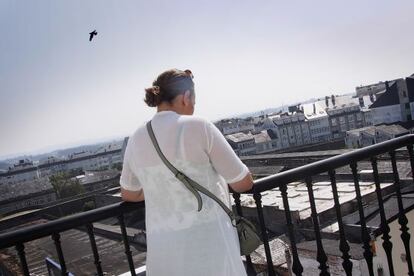“I lost my child as I don’t speak Spanish”
Galician social services accused of giving children up for adoption without consent


On February 11, 2011, Aisha, an Algerian woman living in Lugo, Galicia, was visiting friends in the nearby town of Burela. The 38-year-old, who prefers not to use her real name, was pregnant, and began to feel unwell. She was taken to hospital, where medics performed a cesarean section on her and delivered a baby girl.
Aisha says the infant was immediately taken from her, and she was only allowed to see the child for “a few hours at a time” over the five days she was kept in the hospital. When she was discharged, she says she was told the baby was ill and would have to stay put.
Aisha returned to the hospital the next day, and was told the child was no longer there. In the complaint she filed with the Civil Guard, Aisha says hospital staff told her the local authorities had taken her baby.
The day she had been released from hospital, Aisha, who says she barely understands Spanish, had signed several forms, assuming they related to the birth of the child, and were giving permission for her daughter to remain in hospital while she was unwell. “I lost my child because I don’t speak Spanish,” she says.
When Aisha went back to the hospital, she was told the child was no longer there
Over the course of the following months, Aisha says she repeatedly visited the offices of Galicia’s social services department to try to find her baby. Finally, in October 2011, she took a friend who speaks Spanish, and was told by social services that she had signed a series of documents giving her consent for her daughter to be adopted, and the child was now living with another family.
Aisha reported the case to the Civil Guard and also contacted a local NGO, which provided her with a lawyer. In May 2013, her lawyer asked for the case to be included as part of an investigation underway into several accusations that staff at the hospital in Burela where Aisha’s baby was born had taken away the children of up to a dozen young women over the previous decade.
Operation Baby, as the media have dubbed the case, has echoes of the stories that have recently surfaced in Spain about a network of doctors and religious orders who provided wealthy families with babies during the Franco period.
Police finally began looking into irregularities in adoption procedures in Galicia after four lawyers filed complaints against the regional government.
Operation Baby has echoes of the tales of illegal adoptions under Franco
The exact number of babies allegedly taken from their mothers on the grounds that they were unable to provide them with a proper home is still not clear: sources at Lugo provincial court say “almost 20 families” are involved, while other sources say the number of babies allegedly stolen is around a dozen.
Lawyers for the families involved accuse social workers from Galicia’s social services of taking babies from their mothers “with a view to having them adopted” on the basis of “arbitrary” criteria grounded on subjective reports “that they wrote” or had prepared by Franciscan nuns from the Madre Encarnación Home.
Lawyers representing the women who say their children were taken without their permission, or who were pressured into doing so, say that since they have brought legal action, documents in the social services department have “mysteriously disappeared,” along with other evidence.
They also accuse the social services of being “hasty” in suspending the rights of the infants to have contact with their biological parents or any other family members, and of doing so without following the required judicial procedures. Spain’s Civil Code states that even in cases where a father’s parental custody is taken away, contact with other family members can only be prevented after a judicial review.
Lawyers say social workers took babies on the basis of “arbitrary” criteria
Since settling in Lugo, Aisha has worked as a domestic cleaner, and according to several former employers interviewed by the Civil Guard, is still unable to speak Spanish.
While the investigation into irregularities over adoption procedures slowly proceeds, Aisha has still not been allowed to see her daughter. The child has since turned two years of age, and is living with a foster family in Pontevedra, unaware who her real mother is.
The Algerian embassy has since taken up the case, requesting that the judge overseeing the investigation call as witnesses two senior officials from Lugo social services, along with hospital staff.
A local court is now processing a request authorized by the Galician regional government to allow the family to formally adopt the child.
Aisha and her lawyer have managed to block the adoption proceedings once already, and are again calling on the courts to halt the adoption, arguing that no final decision should be made until the judge has completed the investigation into adoption procedures in Lugo.
Tu suscripción se está usando en otro dispositivo
¿Quieres añadir otro usuario a tu suscripción?
Si continúas leyendo en este dispositivo, no se podrá leer en el otro.
FlechaTu suscripción se está usando en otro dispositivo y solo puedes acceder a EL PAÍS desde un dispositivo a la vez.
Si quieres compartir tu cuenta, cambia tu suscripción a la modalidad Premium, así podrás añadir otro usuario. Cada uno accederá con su propia cuenta de email, lo que os permitirá personalizar vuestra experiencia en EL PAÍS.
¿Tienes una suscripción de empresa? Accede aquí para contratar más cuentas.
En el caso de no saber quién está usando tu cuenta, te recomendamos cambiar tu contraseña aquí.
Si decides continuar compartiendo tu cuenta, este mensaje se mostrará en tu dispositivo y en el de la otra persona que está usando tu cuenta de forma indefinida, afectando a tu experiencia de lectura. Puedes consultar aquí los términos y condiciones de la suscripción digital.








































